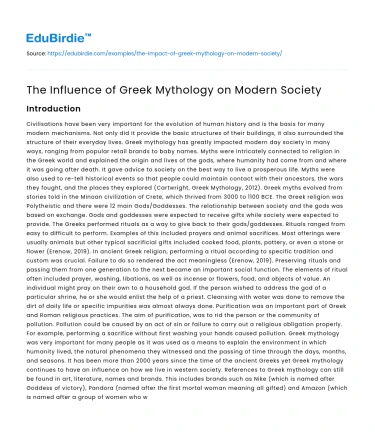Introduction
Civilisations have been very important for the evolution of human history and is the basis for many modern mechanisms. Not only did it provide the basic structures of their buildings, it also surrounded the structure of their everyday lives. Greek mythology has greatly impacted modern day society in many ways, ranging from popular retail brands to baby names.
Myths were intricately connected to religion in the Greek world and explained the origin and lives of the gods, where humanity had come from and where it was going after death. It gave advice to society on the best way to live a prosperous life. Myths were also used to re-tell historical events so that people could maintain contact with their ancestors, the wars they fought, and the places they explored (Cartwright, Greek Mythology, 2012). Greek myths evolved from stories told in the Minoan civilization of Crete, which thrived from 3000 to 1100 BCE. The Greek religion was Polytheistic and there were 12 main Gods/Goddesses.
Save your time!
We can take care of your essay
- Proper editing and formatting
- Free revision, title page, and bibliography
- Flexible prices and money-back guarantee
The relationship between society and the gods was based on exchange. Gods and goddesses were expected to receive gifts while society were expected to provide. The Greeks performed rituals as a way to give back to their gods/goddesses. Rituals ranged from easy to difficult to perform. Examples of this included prayers and animal sacrifices. Most offerings were usually animals but other typical sacrificial gifts included cooked food, plants, pottery, or even a stone or flower (Erenow, 2019). In ancient Greek religion, performing a ritual according to specific tradition and custom was crucial. Failure to do so rendered the act meaningless (Erenow, 2019). Preserving rituals and passing them from one generation to the next became an important social function. The elements of ritual often included prayer, washing, libations, as well as incense or flowers, food, and objects of value. An individual might pray on their own to a household god. If the person wished to address the god of a particular shrine, he or she would enlist the help of a priest. Cleansing with water was done to remove the dirt of daily life or specific impurities was almost always done. Purification was an important part of Greek and Roman religious practices. The aim of purification, was to rid the person or the community of pollution. Pollution could be caused by an act of sin or failure to carry out a religious obligation properly. For example, performing a sacrifice without first washing your hands caused pollution. Greek mythology was very important for many people as it was used as a means to explain the environment in which humanity lived, the natural phenomena they witnessed and the passing of time through the days, months, and seasons.
It has been more than 2000 years since the time of the ancient Greeks yet Greek mythology continues to have an influence on how we live in western society. References to Greek mythology can still be found in art, literature, names and brands. This includes brands such as Nike (which is named after Goddess of victory), Pandora (named after the first mortal woman meaning all gifted) and Amazon (which is named after a group of women who were trained in combat and archery). As well as well-known brands, Greek mythology is also seen in baby names. Names such as Helen, Troy, Damon and Phoebe were based on Gods and Goddesses. These are two of the many reasons for many Greek influences on western society.
Greek mythology has had a large influence on western culture and is in everyday life, whether expected or not. Greece’s impact on modern society shows the importance ancient civilisations have and how they affect simple things such as names and brands. Ancient Greece has given society a basic structure which have been built off to provide the present day reality.






 Stuck on your essay?
Stuck on your essay?

